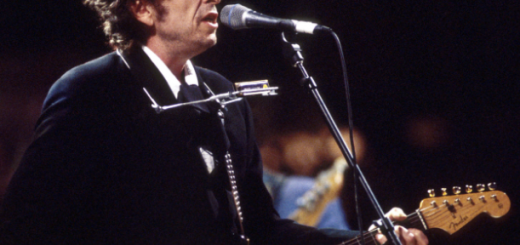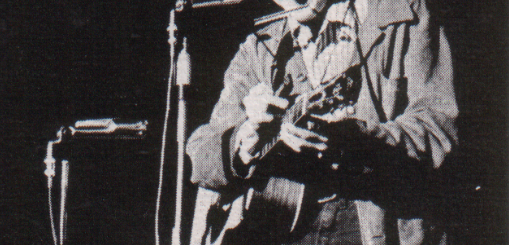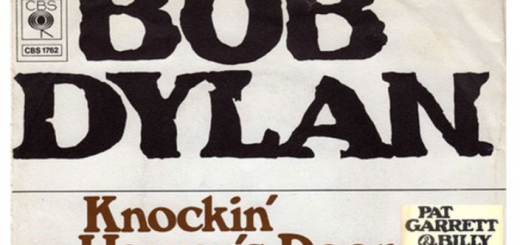Highway 61 Revisited by Bob Dylan Lyrics Meaning – A Road Trip Through Existential America
Lyrics
Abe said, “Man, you must be puttin’ me on”
God said, “No” Abe say, “What?”
God say, “You can do what you want, Abe, but
The next time you see me comin’, you better run”
Well, Abe said, “Where d’you want this killin’ done?”
God said, “Out on Highway 61”
Well, Georgia Sam, he had a bloody nose
Welfare department, they wouldn’t give him no clothes
He asked poor Howard, “Where can I go?”
Howard said, “There’s only one place I know”
Sam said, “Tell me quick, man, I got to run”
Oh, Howard just pointed with his gun
And said, “That way, down Highway 61”
Well, Mack the Finger said to Louie the King
“I got forty red-white-and-blue shoestrings
And a thousand telephones that don’t ring
Do you know where I can get rid of these things?”
And Louie the King said, “Let me think for a minute, son”
Then he said, “Yes, I think it can be easily done
Just take everything down to Highway 61″
Now, the fifth daughter on the twelfth night
Told the first father that things weren’t right
“My complexion,” she says, “is much too white”
He said, “Come here and step into the light”
He said, “Hmm, you’re right, let me tell the second mother this has been done”
But the second mother was with the seventh son
And they were both out on Highway 61
Now, the roving gambler he was very bored
Trying to create a next world war
He found a promoter who nearly fell off the floor
He said, “I never engaged in this kind of thing before
But yes, I think it can be very easily done
We’ll just put some bleachers out in the sun
And have it on Highway 61″
Traversing the cultural landscape that Bob Dylan sketches in ‘Highway 61 Revisited’ is akin to embarking on a journey through the very heart of American existentialism. Released in 1965 as the title track of his seminal album, this song interweaves biting social commentary with biblical allegory, painting a chaotic portrait of a nation at a crossroads.
Dylan’s Highway 61 becomes more than just asphalt cutting through the land; it morphs into a metaphorical battleground for moral quandaries, societal flaws, and the absurdities of existence. So, fasten your seatbelt as we decode the profound poetry and pivotal messages cloaked within the gravelly timbre of Dylan’s iconic tune.
The Genesis of the American Odyssey
The song kicks off with a retelling of the biblical narrative where God asks Abraham to sacrifice his son. However, Dylan’s rendition is laced with irony, and the dialogue takes on a cutting-edge twist. Here, Abraham isn’t just a patriarch; he’s everyman, puzzled and challenging divine authority.
By setting this ancient sacrifice on the modern Highway 61, Dylan strips away millennia, confronting the listener with a question: how much have we truly evolved? The interchange between Abe and God feels like a parable for modern man’s relationship with authority—questioning it, yet all too often bowing to it.
A Cavalcade of Characters: Society’s Melting Pot
Dylan introduces us to a series of bizarre and pitiable characters, each with their own absurd plight. From Georgia Sam, who cannot get clothes from the welfare department, to Mack the Finger with his useless items. With a sharp tongue, Dylan highlights societal dysfunction and the people’s desperate, often ridiculous, coping mechanisms.
Highway 61 serves as a dumping ground for the characters’ challenges and the things they want to rid themselves of. It’s a realm where societal norms are upended and the traditional solutions are useless. Dylan paints with a surreal brush, illustrating the comedy and tragedy of American life.
Unraveling the Enigma: The Hidden Meanings Within
The surreal nature of Dylan’s lyrics may bemuse some, but closer inspection reveals a web of symbolism at each turn. The highway itself, stretching from Dylan’s native Minnesota down to the Mississippi Delta, is an artery of musical heritage, rich with the history of the blues. A history that’s muddled with pain and oppression.
In ‘Highway 61 Revisited,’ the road becomes a sanctuary of absolution and redemption, where the misfits and outcasts offload their burdens. Each vignette subtly critiques post-war America’s values — commercialism, racism, and the looming threat of military conflict — without preaching or overstating.
Lyrical Hooks and Memorable Mantras
Dylan’s lyrical prowess shines brightly in ‘Highway 61 Revisited.’ Lines such as ‘The next time you see me comin’, you better run’ from the opening verse resonate as timeless mantras of defiance. They encapsulate an era’s spirit and the desire to rebel against seemingly preordained paths.
Similarly, the song’s final stanza, with the roving gambler ‘trying to create the next world war,’ succinctly comments on the human inclination towards conflict, with a cynicism so profound it can’t help but be remembered. Each line is a crafted arrow, aimed at the heart of the audience’s consciousness.
A Reverberating Echo in Pop Culture
It’s impossible to deny the cultural impact that ‘Highway 61 Revisited’ has had. Not only did it redefine music’s power as a medium for social critique in the ’60s, but it has also inspired countless artists and thinkers. The song’s structure—thematic verses tied together by a repeating chorus—wove itself into the fabric of storytelling in music.
Even today, the song’s influence pervades, with musicians and scholars dissecting its meaning and finding new resonances with contemporary issues. Dylan’s ‘Highway 61’ is not just a road in the United States; it’s a never-ending journey through the American psyche, littered with wonder, disillusionment, and the quest for a sense of place in a rapidly changing world.








